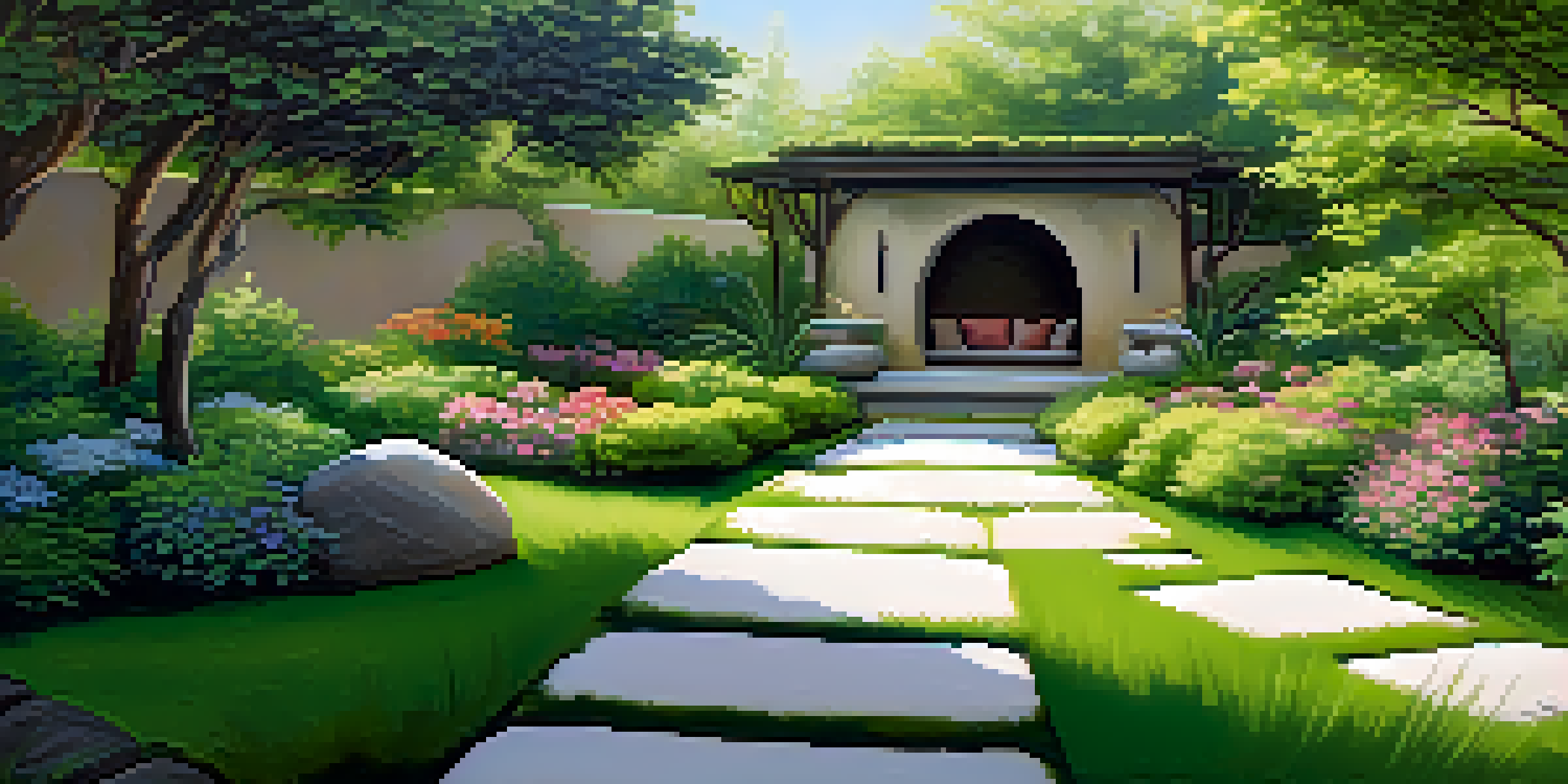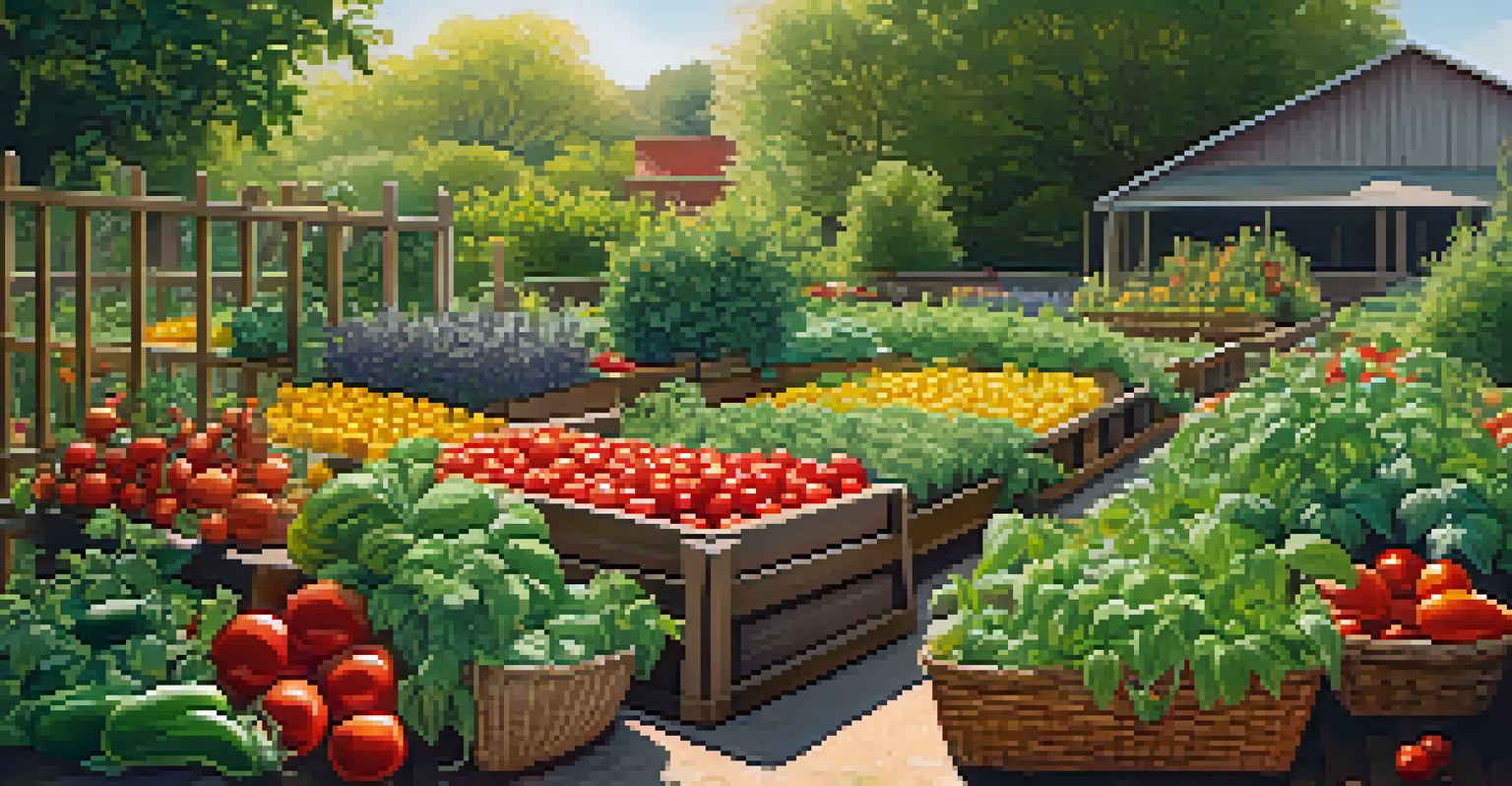Gardening for Wellness: Luxury Spaces for Relaxation

The Healing Power of Nature in Gardening
Gardening has long been associated with numerous health benefits, both physical and mental. Just imagine stepping into a lush garden, surrounded by vibrant blooms and the soothing sound of rustling leaves. This connection to nature can reduce stress, lower anxiety levels, and even boost your mood, making it a perfect escape from daily life.
Gardening is a way of showing that you believe in tomorrow.
One of the most beautiful aspects of gardening is its ability to engage all your senses. The colors of flowers, the scent of fresh soil, and the taste of homegrown vegetables create an immersive experience. This sensory engagement can ground you, helping to promote mindfulness and presence, which are essential for overall wellness.
Moreover, tending to a garden can provide a sense of purpose and accomplishment. Watching plants grow and thrive under your care can foster a rewarding feeling, enhancing your emotional well-being. In essence, gardening can transform your mental landscape, creating a sanctuary for relaxation and rejuvenation.
Designing Your Luxurious Relaxation Space
Creating a luxury garden starts with thoughtful design. Consider your personal preferences and the emotions you want to evoke in your space. Whether it’s a tranquil Zen garden or a vibrant flower patch, the layout should reflect your vision of relaxation, making it a personal retreat right in your backyard.

Incorporate elements such as comfortable seating, soft lighting, and water features to enhance the luxurious feel. Imagine lounging on a plush bench, sipping tea while listening to the gentle trickle of a fountain—these details can elevate your garden from ordinary to extraordinary. The goal is to create an inviting atmosphere that encourages you to unwind.
Gardening Enhances Mental Health
Connecting with nature through gardening can significantly reduce stress and boost your mood.
Don’t forget about the seasonal aspect of your garden. Selecting plants that bloom at different times ensures that your space remains vibrant year-round, offering a continuous invitation to relax and enjoy nature’s beauty. This thoughtful approach not only enhances aesthetics but also deepens your connection to the changing seasons.
Incorporating Aromatherapy into Your Garden
Aromatherapy is a fantastic way to enhance the relaxation benefits of your garden. By including fragrant plants such as lavender, rosemary, and jasmine, you can create a sensory experience that calms the mind and invigorates the spirit. As you walk through your garden, these scents can transport you to a state of tranquility.
Nature does not hurry, yet everything is accomplished.
For a more personalized touch, consider creating an aromatic pathway using various herbs and flowers. Imagine walking through a corridor of scent, where each step releases a new fragrance. This not only engages your sense of smell but also makes your garden a multi-sensory experience, enhancing your overall wellness.
Additionally, the act of tending to aromatic plants can be therapeutic in itself. Pruning, watering, and nurturing these plants allows for a meditative experience, helping to clear your mind and focus on the present moment. This simple yet powerful practice can contribute significantly to your mental well-being.
The Benefits of Edible Gardening for Wellness
Edible gardening is not just about growing food; it’s a holistic approach to wellness. Cultivating your own vegetables and herbs can provide fresh, nutritious options that contribute to a healthier diet. Imagine stepping into your garden and picking a ripe tomato or fragrant basil for your next meal—there’s something deeply satisfying about eating what you’ve grown yourself.
Moreover, gardening has been shown to encourage physical activity, which is crucial for overall health. The act of digging, planting, and harvesting can serve as enjoyable exercise, promoting strength and endurance. By incorporating edible plants, you’re not only nourishing your body but also engaging in a delightful form of physical activity.
Designing a Personal Relaxation Space
Thoughtful design elements in your garden, like seating and lighting, create a luxurious retreat for relaxation.
Finally, sharing your harvest with friends and family can foster community and connection. Hosting a dinner featuring dishes made from your homegrown produce can create lasting memories, reinforcing bonds with loved ones. This social aspect of gardening adds another layer to the wellness benefits, making your garden a hub of joy and togetherness.
Creating a Mindfulness Garden for Reflection
A mindfulness garden is specifically designed to promote peace, reflection, and meditation. By incorporating elements such as quiet seating areas, winding paths, and tranquil water features, you can create a space that invites introspection and calm. This type of garden serves as a personal sanctuary where you can escape the chaos of daily life.
Incorporate natural materials like stone, wood, and soft grasses to enhance the feeling of serenity. These elements create a harmonious environment that encourages you to slow down, breathe deeply, and connect with nature on a deeper level. This connection to the earth can significantly enhance your mental clarity and emotional balance.
Additionally, consider adding features like a small meditation nook or a fire pit. These spaces can serve as focal points for contemplation or gathering with friends, adding richness to your garden experience. Ultimately, a mindfulness garden can be a powerful tool for fostering inner peace and well-being.
The Role of Color Psychology in Your Garden
Color plays a significant role in how we perceive our environment and can greatly influence our mood. By carefully selecting the colors of flowers and plants in your garden, you can create a space that promotes relaxation, joy, or even inspiration. For example, soft blues and greens are known for their calming effects, making them perfect for a serene garden.
On the other hand, vibrant reds and yellows can evoke energy and happiness, making them ideal for areas intended for social gatherings. Mixing these colors thoughtfully can create a dynamic atmosphere that shifts with your mood and the time of day. This intentional use of color can elevate your garden into a luxurious and rejuvenating space.
Sustainable Practices Promote Wellness
Implementing sustainable gardening methods not only benefits your health but also enhances the local ecosystem.
Additionally, consider how colors change with the seasons. Incorporating a variety of plants ensures that your garden remains visually stimulating throughout the year. This ever-changing palette not only beautifies your space but also keeps your mind engaged and inspired, contributing to a sense of well-being.
Sustainable Practices for a Wellness Garden
Sustainability is essential in creating a wellness garden that benefits not only you but also the environment. Practices such as composting, rainwater harvesting, and native planting not only reduce your ecological footprint but also enhance the health of your garden. By building a sustainable garden, you create a space that thrives and flourishes naturally.
Incorporating native plants can also attract beneficial wildlife, like pollinators and birds, which contribute to the ecosystem’s balance. This connection to nature creates a richer environment, enhancing your garden's overall beauty and wellness impact. Plus, watching wildlife can be a calming, enjoyable experience.

Lastly, adopting organic gardening methods ensures that your garden remains free from harmful chemicals. This not only protects your health but also the health of the local ecosystem. By prioritizing sustainability, you cultivate a garden that embodies wellness in every aspect, enriching both your life and the planet.